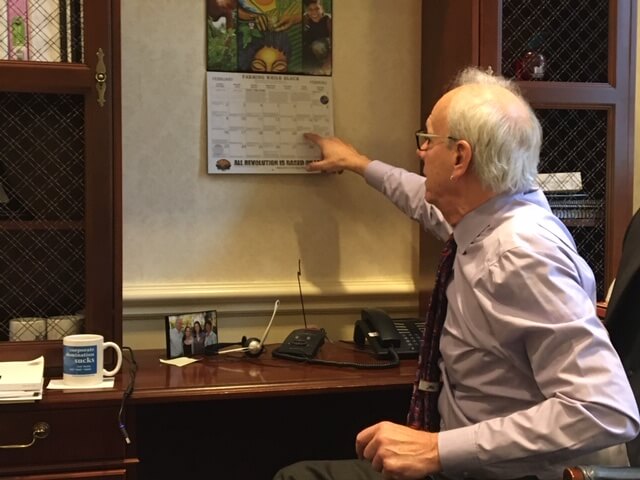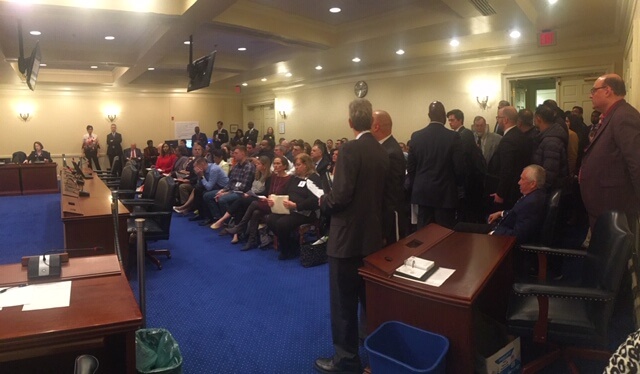Crush of Bills Is Unmanageable, Lawmakers Warn

There is growing consensus in Annapolis that the General Assembly is getting snowed in by an avalanche of legislation.
“We have to do something,” said Sen. Paul G. Pinsky (D-Prince George’s), the chairman of the Education, Health and Environmental Affairs Committee, in an interview. “Quantity has gotten in the way of quality, and that’s a problem.”
The regular deadline for filing a bill this session was Monday in the Senate and Friday in the House. As of midday on Thursday, senators had filed 999 bills, delegates 1,150.
Bills can still be introduced later in the session but they must go through extra hurdles before being considered by committees.
Pinsky said the panel he leads has had several meetings this year during which 20 or more bills were heard. Some sessions ran past 9 p.m. “That’s just impossible,” he told his colleagues on Thursday.

An overflow crowd in a legislative committee room. Photo by Bruce DePuyt
Senate President Bill Ferguson (D-Baltimore City) noted on Thursday that the chamber has only voted on 58 bills.
“There is a real question about the logistics and the quality of the work product that we’re going to have to tackle,” he said. “There is no good solution but we’re going to have to figure this out moving forward.”
In the U.S. House and Senate, most bills never get a hearing or a vote. Legislative leaders in Maryland pride themselves on hearing all bills filed by deadline. And, in Annapolis, most are voted upon.
But the sheer volume of bills, and the growing complexity of issues, are creating a squeeze on a legislative body that meets only 90 days a year.
“This is a bipartisan issue,” Senate Minority Whip Stephen S. Hershey Jr. (R-Upper Shore) said. “We need to look at a more systematic approach to all of the bills.”
Many lawmakers freely acknowledge they have introduced bills not because they passionately support them but to appease a constituent group. Some file measures that duplicate existing law or aren’t well-crafted.
Together, they create a logjam that can impede more substantive bills, former state Sen. Robert A. Zirkin (D-Baltimore County) said.
“It does take time away from bills that are complicated and look like they’re going to move,” said Zirkin, who served as chairman of the Judicial Proceedings Committee until he resigned at the beginning of the year. “This is why some bills don’t make it across the finish line.”
When JPR considered the End of Life Options bill last year, the panel frequently met until midnight, crafting and debating dozens of amendments. Long, late meetings put a strain on lawmakers, staff, citizens and the security personnel who guard the State House complex.
Bill hearings give the public a chance to address state officials directly — and current and former lawmakers are reluctant to advocate for limiting those for fear of antagonizing voters, particularly activists.
But it’s no secret that many hearings go too long, often extended by repeated testimony and comments that stray from the substance of the bill.
“We want to work on quality legislation and not just spend so much time in bill hearings,” Hershey said. “But we’re also not willing, at this point, to give up the fact that every bill in Maryland gets a hearing, because in many states that’s not the case.”
Lawmakers are expected to brainstorm after the 2020 session in search of ways to reduce the crush of legislation. Among solutions informally discussed are:
- A limit on public testimony
- A limit on the number of bills legislators can introduce
- A two-tier system for classifying bills
- An increase in the number of staff lawyers available to help craft legislation
- Creation of a fifth standing committee in the Senate. (Currently there are four committees in the Senate, six in the House)
Pinsky’s committee has 333 bills, far more than any other. He said some bills in his committee will have hearings after the so-called crossover deadline — the deadline for measures to move from one legislative chamber to the other — which will diminish their chances of passage.
Pinsky’s committee also needs to reserve time to deliberate on the Kirwan Commission’s recommendations for improving Maryland’s K-12 education system.
Given the amount of time it takes to discuss, amend and vote on each bill, some just won’t make it, he said.
“I become the god,” he said of his power to craft the voting list. “And I don’t want to be in that situation. I’d rather have fewer bills.”




 Creative Commons Attribution
Creative Commons Attribution